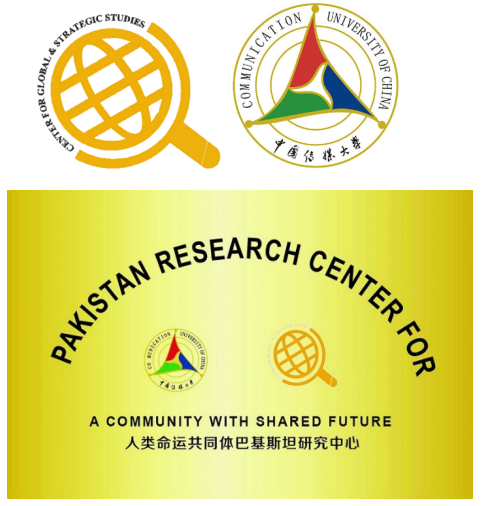
By Ms. Maryam Raza, Deputy Director,
Pakistan Research Center for a Community with Shared Future, Communication University of China (Beijing), China

Published on 24th May 2021
“Collaboration allows us to know more than we are capable of knowing by ourselves”
Academic and research collaboration is a significant valuable tool that foster integration among countries and accelerates progress. It enhances the work quality and provides opportunities to the students or educational institutions to get exposure to other academic networks. Broader academic cooperation is beneficial to the faculty as it establishes new ways for learning and increases the breadth of knowledge. It also enhances the indicators of knowledge and different learning approaches to solve a problem. Regional intellectual cooperation has become the key element for cultural exchanges, increasing people-to-people contacts and information sharing. Both intra- and inter-institutional academic integration encourage the students to gain international exposure and improve researchers and institutions' capabilities and resources. In this regard, the grand vision of a community with a shared future for mankind provides great opportunities for the nations across the globe to have Open Access to information at a multilateral level and resolve common conflicts. The grand initiative by China has paved the way for counties to gather on an integrated platform for academic cooperation. The great theme envisions to eradicate existing prejudices and build communication grounds that will create a coherent partnership among nations. Therefore, the study elaborates the evolution of academic cooperation under this exceptional theme of shared future. The study is analytical as it provides a profound understanding of emerging advanced patterns of education and intellectual networks.
Improving Institutional Quality and Capability: Progressive Grounds

Open Access to information at the multilateral level has become substantial for all wider academic collaboration with scholarly publishing. This dimension includes policymakers, publishers, researchers, funders, governments, learned societies, librarians, and academic communities, to be well-informed on the history, benefits, and outcomes of Open Access to information.In this regard, the role of institutions and academic networks are highly significant. Sharing expertise, new learning tools and techniques always speed up the pace of projects and provide new research and scientific analysis themes. The presence of established channels, such as the academic research networks under the community with a shared future, pave the way for effective communication, sustainable institutional development, and stable partnership. The extensive network among the academicians enables the flow of critical information based on advanced approaches, expertise, and resources. Therefore, such cooperation and networks are highly valuable for information sharing and improve student’s academic achievement.
Theoretical Perspective of Cooperative Learning

Cooperative learning is one of the most remarkable and essential areas of theory, practice in education and research. Cooperative learning exists when the students work together to accomplish shared learning goals. In this aspect, the development work based on cooperative learning nurtured. The exploration of the learning process has deep roots in learning theories which gives a sound conceptual base ad theoretical framework for cooperative learning. This theory has four fundamental perspectives, covering all major aspects of learning and interaction between academic networks. The pillars are as mentioned as follows:
a. Motivational
b. Social Cohesion
c. Cognitive
d. Cognitive Elaboration
In this aspect, applying this cooperative learning framework to a broader academic network is highly beneficial. The students get the opportunity via scholarship programs to get international exposure and learn about each other’s culture. The major facilitators are the wider intellectual networks. Therefore, the cooperation among the existing academic networks, i.e., under the vision of a community with a shared future for mankind, is significant.
Modern Era and Transformation Make Academic Cooperation Necessary

In this multipolar world, countries are inclined towards regionalism and cooperation. The obsolete and dysfunctional principles are replaced by more advanced methods of communication. Thus, the era of technological transformation and digitalization make cooperation among academic channels necessary. The intra-institutional arrangements are imperative for the collaboration of higher education networks in developing countries. The curriculum must be consolidated under an academic environment where it maintains world-class faculty to improve learning, teaching, research and information sharing. The universities, under an integrated platform, provided by China, can establish potential sources for conducting research work that will be beneficial and influential for all states involved. Moreover, the scientific investment and long-term planning would bring positive outcomes and foster inter-state institutional alignments. Internet accessibility and technological progress have been enhancing cooperation among nations in every field. It has enabled new communication tools vis-à-vis providing conducive opportunities for everyone to attain.
Shared Future for the Students
Allowing students to participate in multiple research projects, empowering them and providing them with beneficial opportunities in the community, always results in social advancement. When youth is engaged in multiple inclusive activities, it allows them to get exposure, have confidence, and focus about their direction. In this context, the vision of a shared future allows students to participate or interact from different platforms and obtain maximum benefits with the help of established academic channels. It would allow the states to collaborate and share innovative ideas through intellectual forums. This grand narrative has been resulting in the evolution of the education system adjusted with the requirement of today’s world. A robust and standard apparatus of win-wincooperation among nations and youth can be achieved in future. Thereby, certain prospects are suggested for the students to establish ways for wider collaboration:
Students’Activities under the Vision of a Shared Future
Following suggested activities would enhance integration among all established research channels and benefit the students:
· Constructive ideas sharing sessions.
· Database to access the desired study material.
· Community’s tasks groups to accomplish the mutual objectives.
· Hybrid conferences and sessions for soft skill development.
· Interactive webinar to sparkle intellectual curiosity among students.
· Joint academic research projects on common areas of interest.
· Joint cultural exchange programs to create harmony.

Collaboration Pays Off
The idea of a community with a shared future and dialogue among civilizations has allowed countries to shed the orthodox ways of interaction and move towards a new trend of greater cooperation, collaboration and interaction. The young generation could become the pioneer to commence the collaborative activity in an emerging new pattern. This implies huge responsibility on research institutes, universities, intellectuals and think tanks to establish such constructive interactions among the youth. In this aspect, Pakistan Research Center for Community with Shared Future provides ample number of opportunities to the regional or international students to align under the institution’s colossal activities being conductive frequently. Pakistan research center, with exceptional collaboration with Communication University China (CUC), Beijing, ensures the availability of up-to-date information, skills, vast academic opportunities, research-internship programs, scholarships, and establishing techniques to promote cultural cooperation. Therefore, this close partnership has been resulting mutually beneficial for China, Pakistan and other partner countries. Only collaboration among people and institutions will promote research and development.In developing countries, where world-class resources are limited, collaboration becomes particularly valuable as a means to acquire knowledge and experience.Thus, it is imperative to have a cooperative approach, in sharing knowledge and expertise and providing multiple opportunities to the students and progressive grounds for other networks. Both intra- and interinstitutional collaboration must be emphasized, encouraged and brought to a level where it can impact and improve the quality, resources and capabilities of all established research centers.
Copyright © Center for Global & Strategic Studies (CGSS), Islamabad
https://www.facebook.com/CGSS.PAK/posts/3919761071475705
